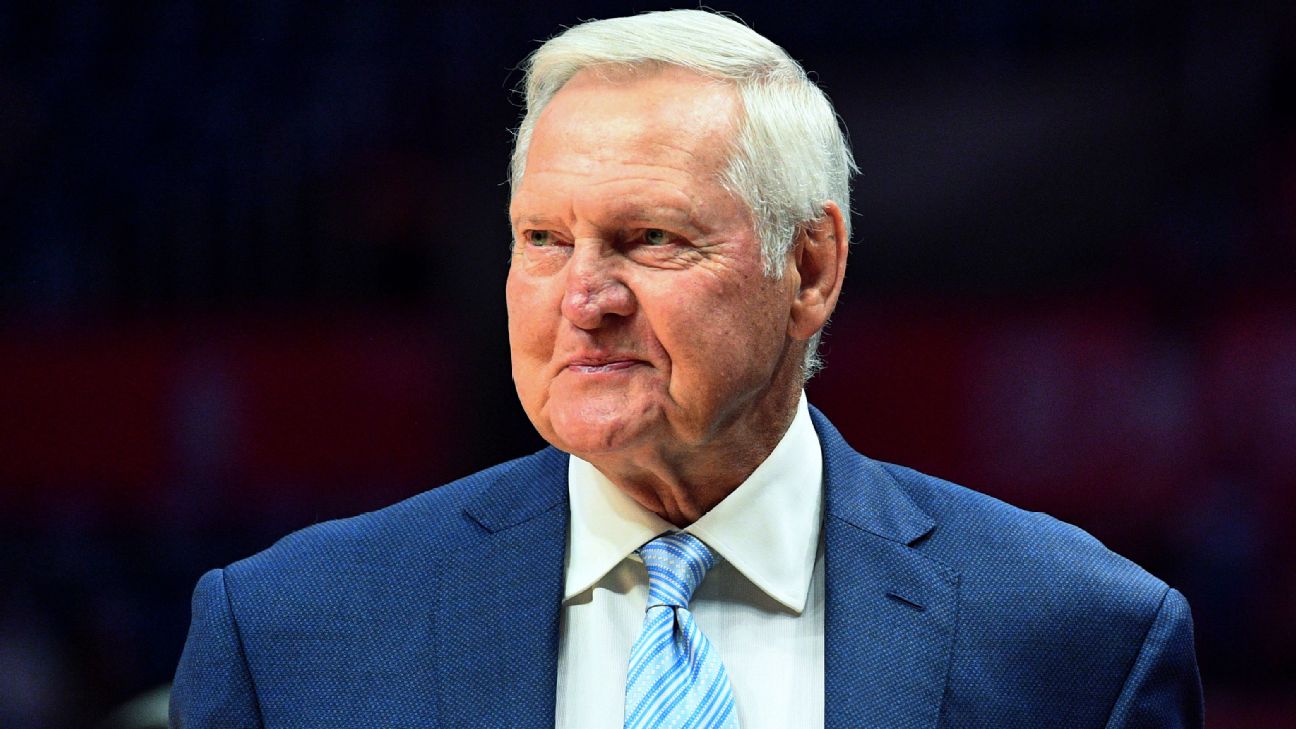
Jerry West, who was selected to the Basketball Hall of Fame three times in a storied career as a player and executive and whose silhouette is considered to be the basis of the NBA logo, died Wednesday morning at the age of 86, the LA Clippers announced.
West was the third player in NBA history to reach 25,000 points, was an All-Star every year of his career and led the Los Angeles Lakers to the NBA Finals nine times, winning one title in 1971-72. He was also a 12-time All-NBA selection, an NBA Finals MVP as part of a losing team in 1969 and part of the NBA’s 75th anniversary team.
“Jerry West was a basketball genius and a defining figure in our league for more than 60 years,” NBA commissioner Adam Silver said in a statement. “He distinguished himself not only as an NBA champion and an All-Star in all 14 of his playing seasons, but also as a consummate competitor who embraced the biggest moments.”
“… I valued my friendship with Jerry and the knowledge he shared with me over many years about basketball and life. On behalf of the NBA, we send our deepest condolences to Jerry’s wife, Karen, his family and his many friends in the NBA community.”
The NBA is planning a pregame tribute to West before Game 3 of the NBA Finals between the Boston Celtics and Dallas Mavericks on Wednesday night.
West was “the personification of basketball excellence and a friend to all who knew him,” the Clippers said in announcing his death, adding that Karen West was by his side when he died.
Following his playing career, West found title success as an NBA executive, building the Showtime Lakers of the 1980s that won five titles in that decade and overseeing the formation of the Shaquille O’Neal-Kobe Bryant tandem. West stayed for just the first title in 2000 as the Lakers went on to three-peat.
He became an adviser for the Clippers starting in 2017, helping to engineer the breakup of the team’s “Lob City” core that led the way to the signing of Kawhi Leonard and Paul George. The Clippers reached the Western Conference finals for the first time in 2021.
West also worked in the front offices of the Memphis Grizzlies and Golden State Warriors.
He was a two-time All-American at West Virginia, where he averaged 24.8 points per game and helped the Mountaineers to the 1959 NCAA championship game, being named Final Four Most Outstanding Player despite a loss in the final to Cal. West also teamed with Oscar Robertson to lead the U.S. to a gold medal at the 1960 Rome Olympics.
All those accomplishments made West one of only three players (along with Magic Johnson and Hakeem Olajuwon) to win a Finals MVP, be named NCAA tournament Most Outstanding Player and earn an Olympic gold medal.
Nicknamed “Mr. Clutch” for his late-game exploits as a player, West went into the Hall of Fame as a player in 1980 and again as a member of the 1960 U.S. Olympic Team in 2010. He will be enshrined for a third time later this year as a contributor.
Even in the final years of his life, West was considered basketball royalty. He routinely sat courtside at Summer League games in Las Vegas, often watching many games in a day while greeting long lines of players — LeBron James among them — who would approach to shake his hand and pay him respect.
“The game transcends many things,” West said while attending Summer League last year. “The players change, the style of play may change, but the respect that you learn in this game never changes.”
In a pair of social media posts, James honored West as a friend and mentor and he was “already missed.”
Will truly miss our convos my dear friend! My thoughts and prayers goes out to your wonderful family! Forever love Jerry! Rest in Paradise my guy! 🙌🏾🙌🏾🙌🏾🙌🏾🙏🏾🙏🏾🙏🏾🤎
— LeBron James (@KingJames) June 12, 2024
A native of Chelyan, West Virginia, West was known as a tenacious player who was rarely satisfied with his performance. He grew up shooting at a basket nailed to the side of a shed and often shot until his fingers bled. He became the first high school player in state history to score more than 900 points in a season, averaging 32.2 points per game in leading East Bank High to a state title.
Basketball, he would later reveal, was his therapy.
In his memoir, “West by West: My Charmed, Tormented Life,” West chronicled a lifelong battle with depression. He wrote that his childhood was devoid of love and filled with anger as a result of an abusive father. He often felt worthless, and to combat that, he said he put his energy into playing the game.
“Success without a personal satisfaction or sacrifice isn’t success at all,” West said during a 2006 speech at a West Virginia commencement. “It’s posturing. Money is a means of power, but seldom a measure of success.”
He is 25th on the NBA career scoring list, and while the NBA has never confirmed that West was in fact the model for its logo — a player dribbling a ball, set against a red-and-blue background — the league has never said otherwise either.
“While it’s never been officially declared that the logo is Jerry West,” Silver said in 2021, “it sure looks a lot like him.”
The Associated Press contributed to this report.











